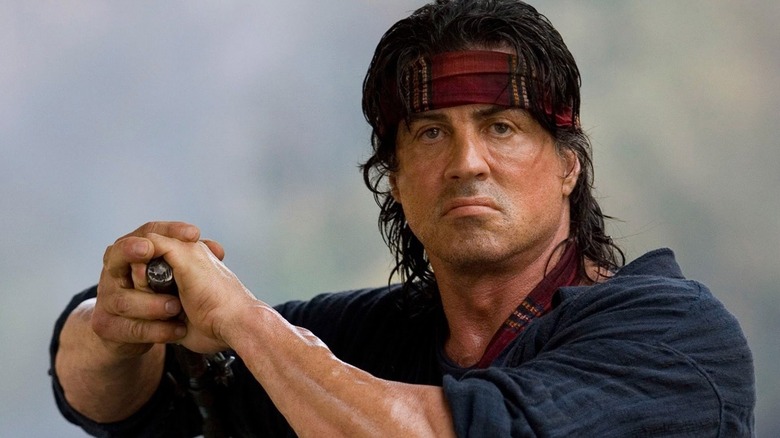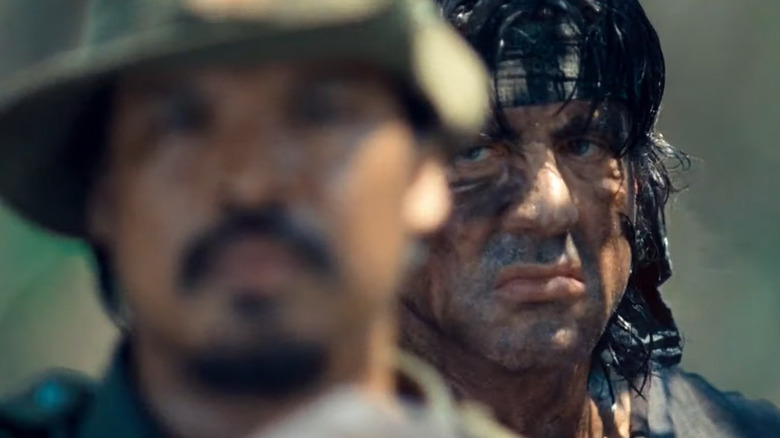Sylvester Stallone's Favorite Action Movie From His Career Is Surprising
Everybody knows that Rocky Balboa and John Rambo (the fictional characters that launched two of the most iconic movie franchises of all time) made Sylvester Stallone's career. But it was the latter that truly turned him into one of the biggest action stars of the 80s and 90s, and ultimately of Hollywood. In 1982, "First Blood" struck like lightning, making over $125 million at the box office on a minuscule $15 million budget. To this day, it features one of the best performances Sly ever delivered, relying mostly on body acting and scarce dialogue — most of which is said in the devastating finale as the protagonist unravels into an emotional breakdown caused by PTSD. It's no secret that Sly fought the original ending (in which his character commits suicide) to replace it with the one that we eventually saw in the final version of the film. He talked about it dozens of times, and it wouldn't shock anybody that he was extremely proud of that movie and what became of it.
In light of that, it's a little surprising that he named 2008's "Rambo" (the fourth instalment in the series) as the best action film he's ever done and is the most proud of. In a 2022 interview with The Hollywood Reporter, the actor said,
"One film I'm truly proud of — it's the best action film I've ever done because it's the most truthful — is 'Rambo IV,' dealing with Burma, where they've had a civil war for 67 years. But I got excoriated because the movie's so violent. And it is violent. It's horrifying. It's children being burnt alive. That's what makes civil war worse than anything: It's your neighbor, all of a sudden, killing you. I was really happy with that film, and I never thought it would ever reach the theater. I thought, 'They're never going to show this.'"
Rambo was uncompromisingly brutal and devoted to its merciless portrayal
I said little surprising because "Rambo" might be Stallone's most adequate action movie that he wrote, directed, and starred in. The film picks up 20 years after the events of "Rambo III," with our hero living a solitary life in Thailand, catching snakes and giving boat rides to people to make a living. But deep down, he's still that same killing machine and broken man that we met in the original movie. After some initial reluctance, he agrees to take a group of missionary doctors on a humanitarian mission to Burma, where the Saffron Revolution is still at large and the Burmese Army ruthlessly rules over the land and its people with an iron fist. It won't take long until Rambo and the group first encounter them, and the carnage begins.
"Rambo" is relentlessly violent and gory, but it's also one of those cases when the uncompromising and severe portrayal actually serves the story the film aims to tell. Naturally, that approach also grants Sly another chance to demonstrate what he did best in all the previous movies: slaughtering baddies with guns and arrows, ripping out esophaguses with his bare hands, and delivering badass lines like "Live for nothing, or die for something, your call," with tremendous gravitas. It's a competently made action film on a mid-budget ($50 million) that managed to revitalize a franchise that was running out of gas. Unsurprisingly, most critics hated it at the time (lambasting its bare-bones plot and excessive violence), but audiences ate it up like fresh and delicious meat. In retrospect, it's the only sequel that came somewhat close to matching the level of the first film, even if it was a bit heavy-handed politically. If you ask me, it's where the series should've ended instead of the atrocity that "Rambo: Last Blood" became 11 years later.

